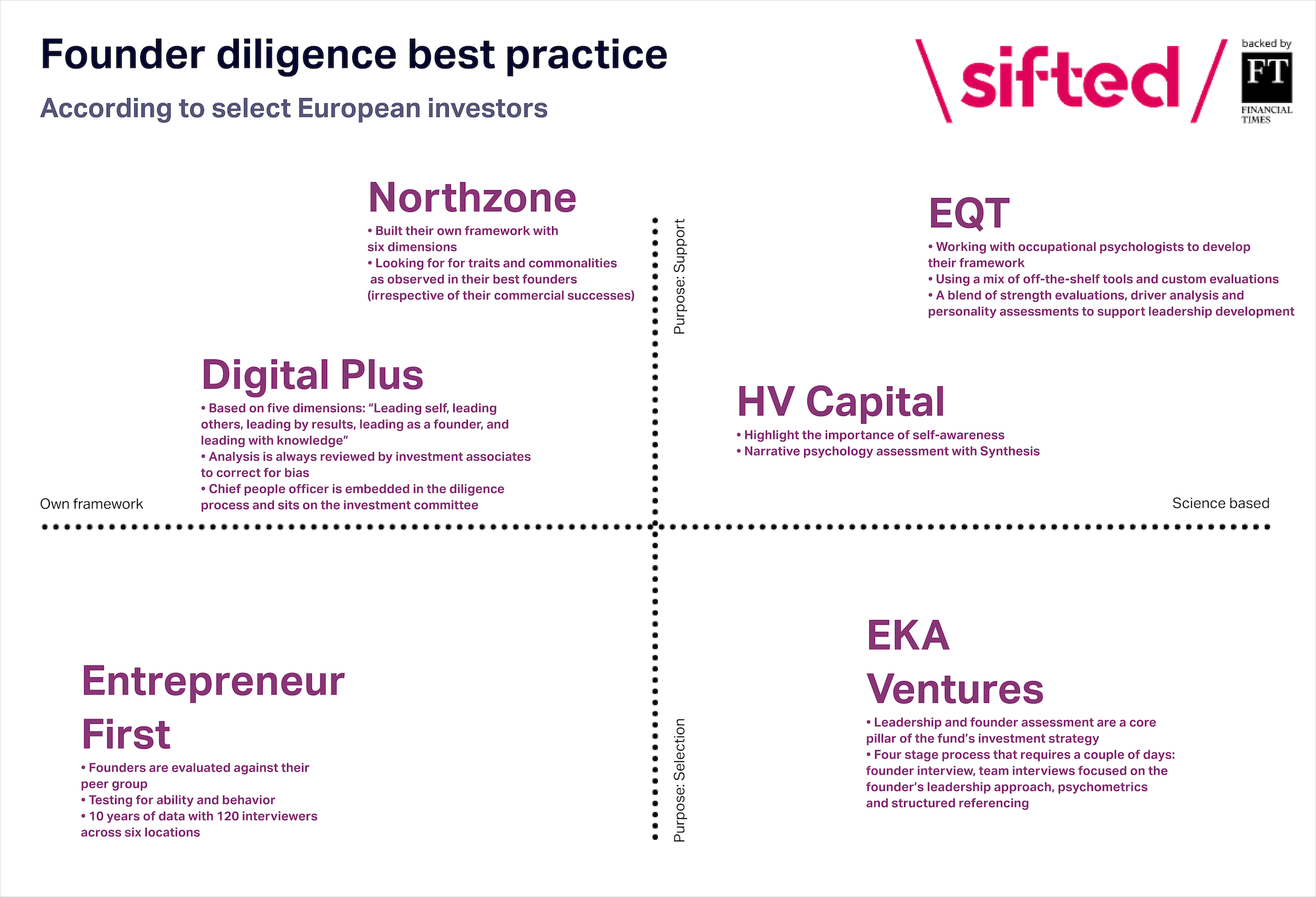Assessing founders and teams is an important part of the VC investment process. And most investors will agree that the strength of the founder is key to the company’s success.
VCs have come up with many different frameworks to assess founder teams. While these frameworks are better than the "gut feel" processes that used to dominate, founder evaluations are still falling investors and founders short. Methods are still too rigid and static, meaning investors are missing some of the best founders. And great founders aren’t getting a chance.
This is the first part of a series on founder evaluation in Europe. In the second part, I’ll share more in depth what the state of the art looks like across European venture funds.
Founder diligence: what is it?
To understand what’s wrong with founder diligence, first, it’s important to understand what founder diligence looks like right now.
In the best firms, evaluation happens in two stages: 1/ the individual stage (looking at the founder/founders as individuals) and 2/ the group stage (how well they work together, what are the team dynamics?). That way, investors can differentiate between top players and their team dynamics.
Evaluations should be a team effort, with the talent partner providing the structure that the investment team uses. They can follow either an interview format or focus on external diagnostic tools. They can be structured or unstructured; they can be framed as a casual conversation or as a dedicated founder interview, depending on what the deal dynamics allow for.
Here’s a matrix of best practice for what that can look like, based on interviews with investors and talent partners at Northzone, HV Capital, Digital+ Partners, EKA Ventures and Entrepreneur First.

This matrix works along two axes:
- Are investors using founder evaluation to filter out teams in the diligence process or rather in order to inform their support offering post-investment?
- Are they using their precious portfolio teams as a benchmark for new teams (backwards-looking), or are they using (predominantly external) frameworks that have been backed by research or validated by data?
The impact of these evaluations on the investment decision varies from fund to fund. In some, marginal cases, they simply offer a route to a veto on a decision. Others make evaluations a mandatory part of their due diligence and involve talent partners. Still others use assessments after a positive investment decision has already been made, to put the founders onto a development programme and create a plan for building an executive team. Some funds share their findings with founders, while others don’t. It really is a wild mix.
To make matters worse, the hot funding market is increasingly shortening diligence timelines for investors. So they find themselves in a tough spot, having to make decisions in a compressed time window.
Personality tests don’t apply
Many VCs rely on personality tests they might have encountered in a corporate career, such as Myers-Briggs, which streams people by personality type. Ironically, by relying on such rigid definitions of personality types, VCs can end up selecting exactly the kind of 'fixed mindset' they are trying to select against.
Ironically, by relying on such rigid definitions of personality types, VCs can end up selecting exactly the kind of fixed mindset they are trying to select against
“I have seen a few funds use psychometric tests, and for those firms who do, they are mostly Silicon Valley-based. Many of them use Hogan Assessments,” says Maddy Cross of executive search firm Erevena.
Yet, even the best personality tests have little to no reliable data on high growth entrepreneurs. On top of that, some of the tests on the market have no scientific backing at all.
Polly Barnes, people and talent operating partner at EQT Ventures, adds: “Founders are starkly different from corporate executives. Successful founders uniquely display both creative and analytic capabilities. In standard evaluation frameworks that would be used in corporates, these two traits would sit at opposite ends of the spectrum. So we have to keep developing.”
Venture needs a customised approach to human evaluation
Despite the great thinking out there, many VCs still use imprecise, overly simplistic evaluation methods that apply better to corporate than entrepreneurial contexts.
Most VCs think of personal development in rudimentary terms: "fixed" versus "growth" mindset. Success in entrepreneurship is about the ability to outgrow quicker than the rest, yet almost all personality evaluation is focusing on how founders show up at one fixed moment in time.
The bottom line is that founders are a unique breed. The specific combinations of traits and qualities investors are seeking are not necessarily the ones being sought by talent hunters in other industries — and even when they are, all the more reason for the savvy investment outfit to devise the best tools to seek out those individuals ahead of the competition. So it makes sense not to submit founders to the same tests of character as other industries.
Neither do any of the out-of-the-box evaluation tools look at the question "How fast can this person grow?" Instead, they frequently rely on personality at one point in time and build a picture of someone based on a comparison with other patterns. While pattern recognition may absolutely capture the notion of "able to rapidly evolve psychologically and functionally", it sadly also promotes bias. Not something the industry needs when we are desperately trying to back underrepresented founders.
It is clear that out-of-the-box, off-the-shelf tools for this express purpose do not — and might never — exist. For this reason, proactive, forward-thinking VC are developing evaluations that are tailored to their unique requirements. I will dive into some of the best examples across Europe in the next article in this series next week.
Julius Bachmann is an executive coach based in Berlin focused on working with entrepreneurs. He is also cofounder of JRNY.